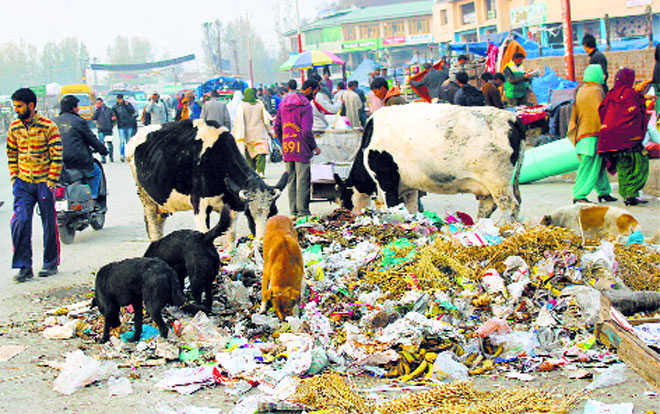Solid waste management in Srinagar still on paper
Rifat Mohidin
Tribune News Service
Srinagar, July 16
More than 13,000 metric tonnes of solid waste that is produced in Srinagar every month may become one of the main challenges for the successful implementation of the Smart City project in the summer capital.
For the past many years, the government has failed to address the menace of solid waste as nearly 450 metric tonnes of solid waste is produced in the city every day and is dumped in the heart of Srinagar in Achen, the only open dumping site in the city.
“Solid waste is not just dumped at the land filling site, but one can find it everywhere. Srinagar was recently ranked among the dirtiest cities in India. The government needs to address the solid waste issue, otherwise it will start stinking and no tourist will visit here,” said a resident of Srinagar, Arif Ahmad.
The waste is directly dumped around a residential area at a government-owned land filling site at Achen without being treated.
The residents of nearby localities protested for weeks together last year, demanding scientific treatment of the waste and shifting of the dumping site, reasoning health and environmental concerns.
“Heaps of waste lying at the site becomes a danger when water dissolves toxic waste materials and contaminates it. The waste needs to be scientifically treated,” said Shazia Nadeem, a resident of Eidgah Achen.
With population of 12.36 lakh, spread over an area of 294 sq km on both sides of the Jhelum river, not even in a single residential area or commercial establishment in Srinagar has the facility of segregation of solid waste, and much of the waste is dumped into water bodies like the Dal Lake.
Officials of the Srinagar Municipal Corporation (SMC) said during the implementation of the Smart City programme, which would start soon, they would undertake door-to-door garbage collection and segregation from residences.
“Two different wastes — bio-degradable and non bio-degradable — would be dumped separately at the landfill site. It won’t lead to health problems and the land filling site won’t exhaust soon,” said solid waste management officer of the SMC Nazir Ahmad Baba.
“We will hand over two bins to all homes so that they can segregate the waste to be collected by the SMC for dumping,” he added.
The official said the bio-degradable material could be converted into organic manure through composting that could be used for farming.
The Solid Waste Management Rules of 2016 lay special emphasis on source segregation of waste that mandates to channelise the waste to wealth by recovery, reuse and recycle.
All hotels and restaurants have been directed to segregate biodegradable waste and set up a system of collection, but the rules are being bypassed in Srinagar and many hotels and houseboat owners dump waste directly into the water bodies.
In Srinagar, 75 to 80 per cent of the municipal waste gets collected and out of this not even 5 per cent of waste is processed or treated.
Given the condition of the solid waste management in the city, Smart City implementation will remain on papers if proper steps are not taken.









